
|
Paladins Of Freedom
By: Thomas M. Ciesla; November 2001 |

|
Paladins Of Freedom
By: Thomas M. Ciesla; November 2001 |
|
Millions around the country sat in silence, staring in disbelief at the carnage on their television screens. The upper floors of one of the World Trade towers were enveloped in smoke, and just below this inferno, a multistory gash had been torn into the side of the tower after absorbing the impact of a 120-ton airplane traveling at 500 mph. Emergency crews scrambled, news crews searched for vantage sites to make some sense of it all. Then, the unspeakable happened – the unforgettable sight of a second airliner appeared on our screens, turned left and smashed into the second tower as cameras were rolling. Abruptly it was clear that these were no accidents. This was a deliberate attack on Manhattan. We watched as a fireball blew out of the other side of the tower, raining debris, hot steel, and body parts onto the sidewalks below. As the towers burned and America tried to grasp the enormity of what happened, we were jolted by another shock as one tower and then another collapsed in on itself. Where moments before stood two 110-story buildings filled with thousands of working people, there now stood an eleven-story pile of burning rubble. All the while, the cameras were rolling – atop other high-rises, in helicopters, on the streets around the disaster. Vivid footage showed pedestrians running in panic as a monster hurled itself towards them, swallowing entire buildings in debris and ash as it boiled outwards from the collapse. Those at ground zero made a futile attempt to outrun the cloud, only to be engulfed in the swirling chaos that choked and blinded all in its path. To those on the streets paying witness, the attack brought not a sharp pang, not a moan, it was so terrible an act that it stunned sensibility. For those inside the airplanes and buildings, we can only surmise that it was a horror beyond belief. We may try to imagine what they were feeling and thinking — but I am certain we cannot. Far from Manhattan, similar destruction was being played out in Washington and in Pennsylvania as two additional commercial aircraft were turned into fireballs by hijackers. It would take hours to fully understand that the hijackers had used our own planes, full of average people, to destroy military and commercial icons. In time we slowly learned what a handful of people around the globe already knew, the hijackers were not Americans. These hijackers were not part of some bizarre American ideological fringe the likes of a Timothy McVeigh, they were part of a far more sophisticated group – Islamic fundamentalists. A well organized, well financed group of individuals willing to sacrifice everything for their beliefs and their leader. Ironically, we knew them. The FBI and Interpol tracked their activities for years; many were on watch lists. These hijackers were part of the same group that bombed our embassies in Africa and blew a hole in the side of one of our most sophisticated warships while it sat refueling in Yemen. We knew them. We knew them on our streets and in our neighborhoods. They sat next to us in restaurants and bars in Florida. They walked alongside us as airport employees in Boston. As it turns out, however, this familiarity was just an illusion: they knew us, we did not know them Days after the destruction, the following was written:
“Four airplanes carrying passengers, three massive structures full of working people – thousands of lives, gone in three hours. Evil touched us that morning, an unspeakable evil, casting a shadow over America as surely as the mushroom- ing cloud of dust engulfed a part of Manhattan Island that morning. Strong men cried. A nation, usually divided over petty issues suddenly became united. Dead! The heroes, the innocents, the fathers, the mothers, the children – all dead. Dead, dead, dead. Who will be their pallbearers? How shall we ever mourn them? How shall we ever right this wrong? How indeed, shall we ever go back to the way things were? That diatribe is an overly dramatic yet predictable reaction as I and the rest of the nation, tried individually and collectively to understand our feelings of guilt, sadness, and anger. I wanted to lash out, to let my anger and indignation explode blindly across the Middle East. Yes I admit it – I wanted revenge! Labels act as a soothing elixir at times like these – we have seen the enemy and named them, whether it be to provide sound bites, or to de-humanize them and thereby allay any remorse about our desire to blow them off the face of this planet. Leaders around the world acted in a similar manner: “irrational madmen”, “international terrorism”, and one that remains in the news today – “evil-doers”. While these labels make us feel better in the short-term and rally folks together, the long- term effects are destructive. To develop an effective strategy against the 'perpetrators', rhetoric must be set aside by the decision makers to allow room for cool, calm reasoning to work.
|

Above photo and at top of page taken at the moment a second aircraft struck the World Trade Center
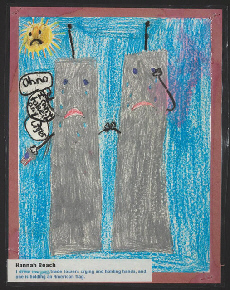 Crying Towers as drawn by young Hannah Beach |
|
But I would like to leave the issue of rhetoric for a moment to discuss some broader issues. For instance, why the World Trade Center? Why have the Islamic fundamentalists been after those two towers for almost a decade? For people worldwide, the twin towers of the World Trade Center have served as a defining symbol of the modern world; a symbol of promise, progress, ingenuity, wealth and unlimited opportunity. For a handful of others on this planet, however, the World Trade Center epitomized American greed and ruthlessness; a land of heathens vanquishing the planet; a land of infidels. Infidels – another great label. Quite simply it means someone with no religious faith. More specifically, these days it is used against someone who does not accept a certain faith, especially the Christian or Islamic faith. I find it interesting that the dictionary describes it in such equal opportunity terms. After the September 11th disaster, a group of third-graders in Harlem were asked to create drawings to help them deal with their feelings about the tragedy. I was in awe at the ability of these children to express such strong emotions with such relatively simple drawings. One drawing stood out in particular, depicting the two towers as living things. Each tower had a pair of eyes with tears falling down the outside of the building and mouths forming intense frowns. Both towers also had a pair of arms with each tower reaching out to grab the other. The artistic minimalism in this child's drawing conveyed to me the most powerful emotions I could imagine. Though the image of the drawing lasted only seconds on the television screen, something about it haunted me. Eventually I realized that when I looked at the World Trade Center, I saw something quite different from that child artist. While most of us focus on the two majestic structures standing against the Manhattan skyline, this child saw something else –- the space between them. Two separate buildings, two entities divided by a space that though relatively small, remained unbridgeable. Unnoticed yet unbridgeable until seen through the eyes of that 3rd grader. Two towers, two perspectives, two beliefs, two worlds vastly different from each other; the space between these buildings inadvertently reflected the chasm between human beliefs, theologies, and ways of life. Yet there was something more than just a Christian/Islamic, modern world/old world struggle being represented. The space between these towers at once separated them and strengthened them, achieving a grand visual impact of fortitude and resolve. The twin towers were more than just about money and opportunity. Those towers represented a strength in the American way and the one pure, overwhelming American truth so despised by the Islamic fundamentalists: the towers were our paladins of freedom. Perched on the eastern edge of this continent, the World Trade Center brashly announced a land of religious and social freedom, a land of opportunity where you could realize your dreams. Freedom is good isn't it? Some argue that it was not freedom that was attacked. Rather they say the attack was nurtured by our presence in Israel and the Persian Gulf. If we extend that line of thinking, would it follow that if America was not present in those areas, there would be no hostility directed towards us? I think not.
Why do so many people from the Middle East hate us? This question raises a Churchillian irony in relations between the West and the Middle East. Over one hundred years ago in Sudan, then part of British-administered Egypt, a man appeared by the name of Mohammed Ahmed, calling himself the second great prophet of Islam – the Mahdi (messiah). The Mahdi attracted a fanatical following that became known as the Dervishes, bent on ridding the area of the insolent British. The Mahdi and his 'whirling Dervishes' defeated the British in the late- 1800s. Ten years later, the British embarked on a campaign to recapture Sudan, a campaign in which the young Churchill served and in what was to be the last cavalry charge of the British army. Churchill's experiences during that campaign formed the basis of his book, The River War, in which he predicted the inevitable clash between the Islamic world and the West, and what he saw as the effects of Mohammedism on the populace. Churchill viewed Mohammedism as a militant, proselytizing faith that advanced slovenly systems of agriculture, sluggish methods of commerce, and a degraded sensualism that deprived life of its grace and refinement. It has been speculated that the Mahdi's fighters that overtook the British in Khartoum and the fighters that Churchill faced a decade later were in fact a splinter group of Islam know as the Wahhabis. The Wahhabis are followers of the most extreme form of Islamic fundamentalism, Wahhabism, formed in the seventeenth century in the area of what is know today as Riyadh, Saudi Arabia. Osama Bin Laden is a Wahhabi, as are his Egyptian allies, Algerian Islamic terrorists and the Taleban who practice a variant of Wahhabism. The official religion of Saudi Arabia remains Wahhabism and is supported by the royal family. Though not all Muslims are Wahhabis, all Muslim suicide bombers are Wahhabis. Interestingly, Yasser Arafat and Suddam Hussein are atheist leftists, not Wahhabis; an important distinction that we'll explore later. |
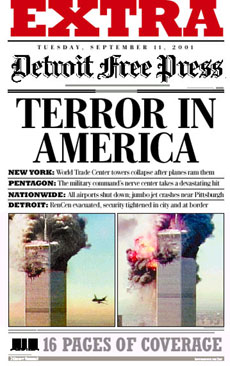
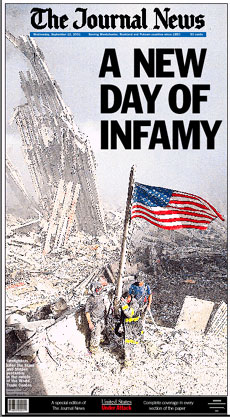 |
|
Wahhabism is stripped down, skeletal Islam: no adornments in the mosques, no music, no pictures of humans, no aspects of modernity, severe punishment for drinking or sexual transgressions. The faith has a fearful and primitive view of women, condemns unbelievers who do not pray and offers no tolerance for other cultures or religions. The goal is to bring about a global revolution based on Wahhabi teachings through violence and bloodshed. Followers of this faith have been active in Iran, Chechnya, Dagestan, Nigeria, Sudan, Turkey, Pakistan, Uzbekistan and Indonesia; Ben Laden and his minions are operating in over 60 countries What is important about this faction of Islam? Fifty years ago a panic washed across America and its allies – the Communist World Conspiracy – the fusion of the Soviet Union with the Chinese Peoples Republic, the great 'Red Scare'. That panic set into motion the greatest buildup of weapons of mass destruction ever known to the human race. Ideologically Communism and Wahhabism are at opposing poles, yet both are revolutionary movements with a vision of global domination. The preponderance of Muslims as perpetrators of ghastly acts over the past decade is no coincidence. Nor is it a coincidence when you examine the areas of the world feeling the brunt of Islamic upheaval, all have significant oil & gas resources, or major existing or planned pipelines. The jihad' called for by Bin Laden and the Taleban, has actually been in effect since the Dervishes battled the British over one hundred years ago. The conflict never ended, rather, it went into a 'smoldering mode' for the last half-century. We can posit that the resurgence of this fanatical movement was fueled, ironically, by petroleum profits, the brunt of which flow into the coffers of Middle Eastern nations that are the primary supporters of fundamentalists. In today's world it takes lots of money to organize international groups of terrorists, establish training camps, influence governments, purchase weapons, computers, communications networks, training, identities, and yes, airline tickets. The West's vice-grip dependence on oil is the engine providing the cash flow to these groups. Every President since Nixon has proposed some type of national energy policy to ease our dependence on foreign oil – to no avail. Why? While it is true that there is only so much petroleum left on this planet, domestic and international companies that derive their wealth from oil have no interest in stemming the flow. As a nation not known for long-term strategic planning, this does not bode well for America. Our 'banana now' mentality for quick profit and political gain has put us in the unenviable position of being dependent on Islamic nations with strong fundamentalist ties for a major percentage of our oil – unarguably the lifeblood of this country. As I write this we are dropping bombs on one of those Islamic nations. 'An enemy of my friend is my enemy?' Let us return to the subject of rhetoric for a moment. Rhetoric, the art of using language to influence others – is a tool commonly used by all sides of a struggle. In times of war we are all, in a sense, iconoclasts. America, the Taleban, Bin Laden, Pakistan, Russia, and various states in the Middle East have all contributed to the barrage of rhetoric aimed at rallying respective populace and/or supporters. Sadly, rhetoric is also a double-edged sword, often inspiring additional hatred and determination in the opposition. In the hours and days immediately following the September 11th attack, a good deal of the West's rhetoric was aimed at comforting a shaken people. Terms such as: “faceless cowards', 'fanatics', 'irrational madmen', and 'we have seen the face of evil' were not technically accurate, but that was not the point. When called upon to address a nation facing a terrible tragedy, you do not strive for linguistic perfection or issue lectures on perceived weaknesses in the geopolitical arena. You speak emotionally and patriotically, with a touch of bravado. You tell the populace what they want to hear -- what they need to hear to get through the initial shock. |
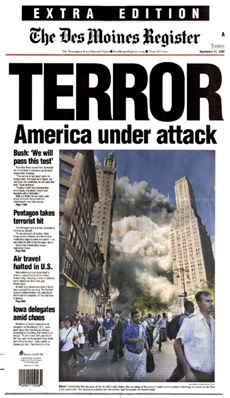
|
|
As President Bush escalated from: 'The war of the 21st Century', to 'A New War', to 'Monumental Struggle of Good Versus Evil'; news program tag lines evolved from 'America Under Attack', to 'America's New War', and 'America Rising'. In the shadow of this admittedly self-serving rhetoric lurked a group of self-righteous celebrities so full of their own importance that they managed to forget the basics of civility, including respect for the dead and the mourning families. Rather than accepting the speeches for what they were – a means to calm a nervous, frightened public – these writers, talk show hosts, artists, professors and religious 'leaders' chose to offend not just the thousands of mourning families, but all reasonable Americans. They pronounced that 'cowardice' did not apply to the terrorists, but rather our troops lobbing smart bombs from afar. Television Evangelists shocked even their followers by extolling that America 'got what it deserved for offending God'. Fortunately for these quasi-intellectuals, who cannot distinguish the attacked from the attackers, America is a land of free speech. In the Middle East, they would have been executed for speaking out in this manner. An interesting Churchillian perspective arises here. When Churchill referred to Hitler as “that bad man”, he was criticized for his judgment call by 'sophisticated Britons'. This reaction closely tracks with that of these self-loathing celebrities who filled the media with their pontifications. Rhetoric can of course be dangerous when it is rhetoric disguised as truth. There exists in this conflict an element of rhetoric-as-denial: 'This is not a holy war', all the western leaders have said. Yet, the sons of Abraham and their children's children (being Christian and Islamic), have been locked in a conflict rooted in antiquity. In truth, wars of religion have not faded away; political leaders simply describe them in different terms. Religious conflicts over the last twenty centuries have shaped the history of the human race and our perception of who and what we are. In modern times it has been easy enough for religious extremists to mobilize people to political action by employing political repartee.
Secularism versus Wahhabism Let's revisit the question, “Why do the people from the Middle East hate us?” In 1787, the United States separated Church and State. How could it be otherwise given our Constitution? If freedom of speech and freedom of worship were to be the fundamental building blocks of the nation, allowing a single religion a special relationship with government would violate that Constitutional law. Granted that there is unspoken link with American life and Christianity, but Christianity comes in many forms, and it is not the only religious genre` in the land. Secularism is necessary if we are to maintain the four freedoms President F.D. Roosevelt outlined in his speech to Congress in 1941: “freedom of speech, freedom to worship, freedom from want, freedom from fear”. To worship as one sees fit is an underpinning of a free society. So if this conflict exhibits the vagaries of a religious war, what of our 'paladins of freedom' analogy? To religious fanaticism, everything is viewed in religious terms, therefore our secularism is viewed by them not as a separation of church and state, but as a rejection of religion, therefore deeming us as evil, as Satan. Yet these fundamentalists preach something well beyond disagreeing with our secularist stance; they hold that there is only one religion -- their religion -- with no tolerance for other faiths: in other words, no freedom to believe otherwise. Religious wars are attacks at the most fundamental level, wars against freedom of choice.
|
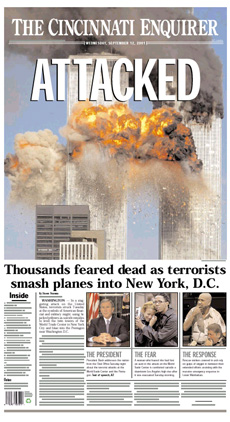
|
|
President Bush has promised to rid the world of terrorism, starting with the followers of Osama Bin Laden and ending with terrorists around the world and the countries that harbor them. If we are effective in Afghanistan, then what? Are we prepared to extend the war to other Middle Eastern nations? If we are to make good on our promise to stamp out terrorism around the world, then we must do exactly that. Sadly, this will create a potentially chaotic situation for the entire civilization of this planet. What of Saudi Arabia? The Saudi's were eager to allow our troops access to their soil in order to stop Suddam Hussein, yet refused the same access in our campaign against Bin Laden in Afghanistan. Based on what we have discussed, one might speculate that since Sadamm is an atheist, the Saudi's felt justified. Could there be something else at work here? Is it possible we are not as clever as we think we are; is it possible that in the grand chess game of mid-East relationships America has been played the unwitting pawn? We have already mentioned that Wahhabism is the official religion of Saudi Arabia and the Saudi family supports the religion. By allowing Americans (infidels), to enter the country, the Saudi family had to know it would trigger a hostile reaction amongst Wahhabi's who see our presence as a desecration of the Holy Land. Bin Laden is a Wahhabi who went after the Russians in Afghanistan for much the same reason. This begs the question, “Have we been set up?” In a war against terrorism, Saudi Arabia would have to be called to the carpet, along with Iran, Iraq, Libya and Syria. Is the West prepared to embark on this path that would surely disrupt the flow of oil, impact economies, industries and transportation infrastructures around the world? Or has the process already begun? In August, Crown Prince Abdullah wrote a letter to President Bush that Saudi Arabia and America had reached a crossroads. “A time comes when nations must part.” This was followed with the post-attack fiasco by a member of the royal family at ground zero, smiling as he handed the mayor of New York a check for $10 million, while his aides released a letter to the effect that the attacks were America's own fault. Mayor Giuliani had the wisdom to return the check.
|
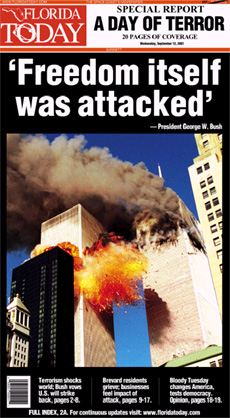
|
|
America is a conundrum; challenge us and we rise to the occasion, yet without a challenge we become complacent. In a twisted way, America needed the Soviet Union because we need a 'bad guy'. Our astronauts would have never walked on the Moon if not for the Soviet challenge, nor would we have the dizzying array of medical and technological advances that directly or indirectly came about from our struggle with the Soviet Union, each trying to out-best the other. We did little to respond to the range of terrorists attacks over the past decade including the Lebanon Towers bombing, the Khobar Towers, the Kenya and Tanzania embassies and the USS Cole attacks. Emboldened by our lack of response to the atrocities, the terrorists network decided it was time to wratch-it-up-a-notch with a major attack on American soil. I suspect that someone, somewhere in that organization realizes they have made a serious mistake. Complacency for terrorism committed beyond our borders was mistakenly seen as a lack of will and spirit. Bin Laden and his followers have given us something that twenty years of terrorists-acts abroad could not, they gave us that 'bad guy' we so desperately need to take action. If President Bush carries out his stated plans to hunt down terrorism wherever it exists, we are all in for extremely difficult times. It is impossible for this type of campaign to be limited to one nation, therefore what is at stake is not just the lives of our military and the citizens of the nations harboring terrorists, but the spark of every civilized country in the world. This conflict, this dual holy war, carried out to its completion, has the potential to disrupt everything we know to be real and familiar; an end to the status quo. What are the potential realities? Chemical warfare, bio-terrorism, not like the scattered anthrax cases we are experiencing right now, but on a far wider scale. The use of nuclear weapons on cities around the world, even if they are only the smaller 'suitcase style' bombs which are still capable of great destruction. The withering effects of an oil stoppage from the Middle East could lead to economic hardship, civil unrest, starvation, and depending on the severity and timeline, the toppling of weaker governments around the world. It is difficult to find a 'good' solution to the current situation. If America does not live up to its promises, we will appear as weak as our enemies think we are. If we pursue the main objective, a global crisis is likely; once additional Middle East states are drawn into the conflict, the West will have to use military force to secure oil fields in the area. This becomes the point of no return, a point where some level of nuclear exchange is imminent, and perhaps on more than one continent. The Islamic extremists may get their 'jihad', though perhaps not as they envisioned. The attack on America has set forces in motion that will ultimately sweep across this planet in one form or another for years to come. Forces and consequences not easily stopped, for it is doubtful that the wisdom to solve this ancient conflict can be found today in the sons and daughters of Abraham. Thousands of souls and America's two paladins of freedom have been taken from us. No matter -- after that September morning two hundred million replacements were lining up to be counted.
|
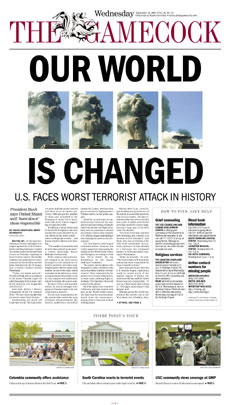
|